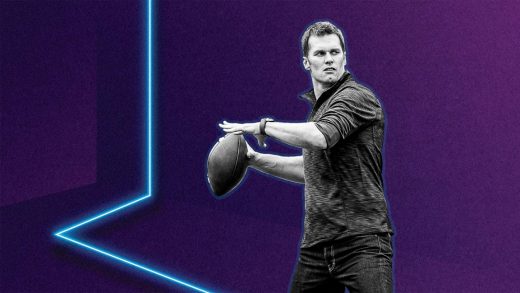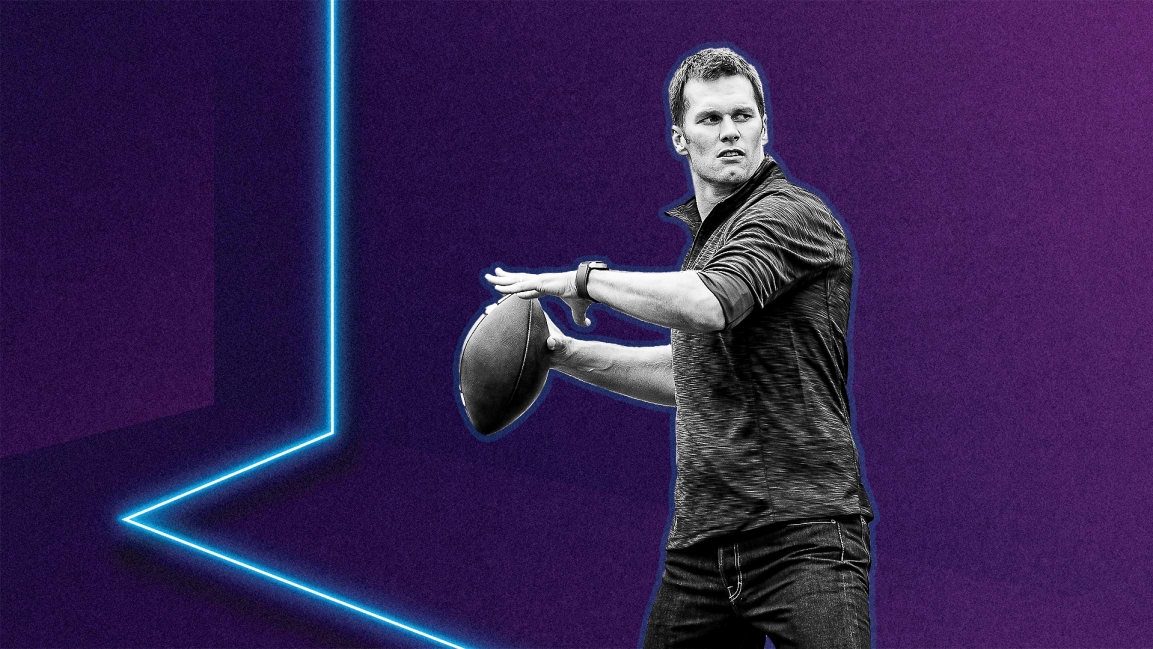Inside Autograph, Tom Brady’s NFT startup
Ever wondered about the strangest thing six-time Super Bowl winner Tom Brady has signed? A fan’s forearm, he revealed, in an invite-only Discord this March. “They got a tattoo over that…it was pretty cool,” he said. Rob Gronkowski, aka “The greatest NFL tight end,” aka “The Gronk” chuckled. “I signed 10 kids in a row [on] their forehead [at football camp], and they ran away showing it off,” he told Brady. “Weird [but] they loved it.”
Their banter continued for 20 minutes before they touched on the reason for their broadcasted bro-down: Tom Brady’s much-hyped celebrity NFT agency, Autograph, which launched in August 2021. In April, the company inked a multi-year deal to make NFTs for ESPN.
Around 600 members tuned in to the Discord, ostensibly to get the lowdown on their latest NFT drops, but most queries were far more personal: What were the best touchdowns (the 2010 Cincinnati Bengals game for Gronk), what makes someone successful (determination, discipline, and a great attitude, says Brady), and how built Gronk is (“this boy’s jacked!” says Brady).
Finally, the chat moderator, Autograph’s co-founder and CEO Dillon Rosenblatt, rolled out some NFT-specific questions about their crypto collectibles. What makes them unique? “This isn’t just two players on a card,” Gronk said. “It’s the connection we’ve built over 12 years.”
“We’re going to create the most unique NFT experience in the world,” added Brady.
Autograph is part of the ever-growing ecosystem of celebrity non-fungible tokens, digital assets that represent ownership of all types of media—a group wide-ranging enough to include Paris Hilton, Quentin Tarantino, Lindsey Lohan, Stephen Curry, and LeBron James. Small wonder that some companies and celebs have been making a cash grab considering the NFTs are now a $17 billion industry, up from a $210 million in 2019.
To be sure, a poorly executed NFT can wreak havoc on celebrities’ reputations, not to mention the always-present moral question of urging your fanbase to make high-risk purchases, but many seem willing to chance it. Sports NFTs, in particular, have attracted a big following—an April 2021 McKinsey survey of 2,500 U.S. consumers aged 18-65, estimated 0.5% to 1% of U.S. adults have purchased a sport NFT, and Vancouver-based Dapper Labs, the official marketplace for NBA and NFL NFTs raked in $100 million in 2021.
“Sports fans are interested in collectibles, and investing in a collectible that’s purely digital is not hard for them to grasp,” says Yash Patel, a general partner at Telstra Ventures, who invests in eSports and web 3.0 companies. “Most celebrities really understand the value of collectibles, because they are collectibles themselves.
The vision for Autograph was dreamed up in 23-year old Dillon Rosenblatt’s bedroom, courtesy of his middle school football and basketball card collection, and a dash of old-fashioned nepotism. Rosenblatt’s “affinity for collecting” resurged during the pandemic, and coupled with his interest in web 3.0, sports NFTs felt like an obvious next step. “I got really excited about the potential of digital assets,” he says on our Zoom call, adjusting the black baseball cap he’s paired with an oversized black hoodie. “It’s very easy to understand that I collect sports cards in the physical world. Now those are digital.”
He did some research, then presented his concept to his father, millionaire media mogul Richard Rosenblatt, the CEO of Intermix, which is owned by Newscorp, alongside their longtime family friend, Tom Brady. “I’ve put together hundreds and hundreds of pitches throughout my life,” he says. In 2015, as a high school sophomore in Los Angeles, he co-founded a now-defunct Uber-for-tutors app with a friend. “I told [Brady and my father] that with this new technology…we can create a new era of collecting,” he says. “It was a dream come true when they got excited.” The pair signed up as co-founders.
With Brady involved, Rosenblatt was able to onboard some major players — Autograph’s advisory team includes Apple Senior Vice President Eddy Cue, tennis star Naomi Osaka, DraftKings co-founders Jason Robins and Paul Liberman, and L.A. Dodgers owner Peter Guber. The founders closed a $170 million Series B round in January 2022.
Autograph’s unique selling point, Rosenblatt says, is that their NFTs are individually signed—his team FedExes iPads loaded with a proprietary app to Autograph’s celebs—called “partners” or “icons,”—who then scrawl their signature with the Apple pencil. “It takes them hours,” Rosenblatt says, who considers the time well spent—collectors receive a far more personalized trophy than a mass-produced signed poster.
“The model of monetizing the fan base [and] connecting with a fan base at the same time [through Discord chats] is something completely new,” says Bo Ilsoe, the managing partner at Palo Alto, California-based NGP Capital, who invests in mobile tech and services. “This is a win for me as a fan, and a win for the franchise.” Ilsoe, who has yet to purchase any NFTs (“I haven’t figured out what to buy yet,”) says tapping sports fans is a smart move, as they’re a large, invested audience. “When you build new business models around that it becomes really exciting for a fan… maybe if I collect 10 of these I will get ringside seats or whatever,” he says.
Autograph has also made a few other key moves to make NFTs accessible to more people. Its collaboration with DraftKings allows customers to purchase the NFTs using credit cards instead of cryptocurrency. Its prices are also relatively affordable, compared to the rest of NFT land: Autograph sold 5,000 Tom Brady NFTs at $12 a pop. “We could have charged much, much more,” says Rosenblatt, “but the point was to create an accessible experience… to get this in a ton of people’s hands.”
Small investments can lead to larger ones—and events like Tom Brady and Gronk’s Discord chat are intentionally designed to promote community buy-in. It certainly gets fans closer to their idols. There’s a tangible financial reason for this: 50% of NFT owners say community is a major contributor to their collecting.
To keep that cozy, chatty vibe a core element of Autograph, Rosenblatt says he’s selective about what celebs pass muster. “We say no to a lot more people than we say yes to, both on the individual and IP perspective,” he says. He needs stars that are willing to engage and develop their communities, not those looking for a one-stop NFT drop shop. “We want talent (to) work on a bespoke basis, more as partners than a platform.” Tom Brady’s star power and his father’s connections help: a wide array of stars have agreed to their terms, including Simone Biles, Naomi Osaka, and Usain Bolt. NFTs with Tiger Woods and yet-to-be-named NBA stars are in the works, as are in-person events. Sports stars are easy to work with, Rosenblatt says—attributing that to Brady’s influence, and the “personal relationships” he has with their clients. “He set the precedent: If you’re going to join this family and ecosystem, be yourself, be cool.”
For all the talk about fans and community, the downside of NFTs is rarely mentioned, even though prices have leveled off since last year. In March, the F1 Delta Time racing game, which sold in-game Formula 1 NFTs shuttered, rendering all NFT purchases worthless, highlighting how unstable the space can be. “It’s a completely speculative and risky bear market,” says James Wo, CEO of blockchain investment firm DFG. “There’s no barrier for issuing NFTs, and there are so many—NFTs are still very immature.”
Still, the celebrity NFTs have a competitive advantage, says Patel. “Celebrities are taking equity stakes and investing their own capital into these companies,” he says. “They’re [not] jumping onto some hype bandwagon. They’re brand ambassadors [and] putting their reputations on the line in a much bigger way than with Cola endorsements.”
That’s what Rosenblatt is banking on—so much so, that he’s expanded from sports into the wider entertainment and music biz through a multiyear deal with AEG Presents. His Los Angeles workforce has ballooned from four to 60 people over the past year. “A year from today, you’re gonna see a meaningful difference in the number of people in your personal life buying and owning both cryptocurrency and NFTs,” he says. “The hype is real.”
(43)



